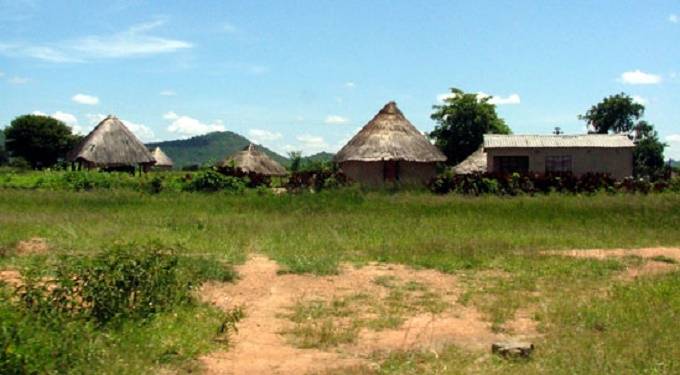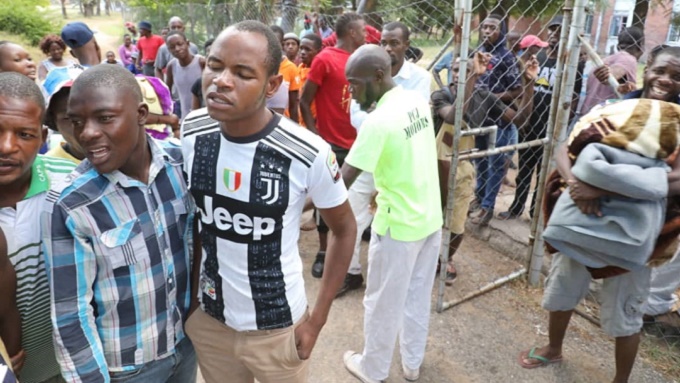Rural communities conform to lockdown regulations

Mashudu Netsianda, Senior Reporter
RURAL communities are conforming to the lockdown regulations albeit struggling in terms of observing social distancing, a key factor in terms of safeguarding against the spreading Covid-19 while traditional leaders have also cancelled all public gatherings in their localities.
A Chronicle news crew visited Inyathi in Bubi District and observed that the generality of the rural communities was wary of the deadly pandemic, which has so far claimed about 115 000 lives with more than 1,8 million people infected globally.
Although people generally practice hygienic standards such as washing hands using water and soap, the principle of social distancing remains a major challenge as people are largely failing to embrace the practice, especially in public places such as business centres and water points.
At Mahamba Business Centre, the news crew observed a large gathering of people in shop verandas and drinking outlets mingling with each other.
Villagers who spoke to the Chronicle said they were aware of Covid-19 and adhering to the lockdown regulations.
They said they were also relying on radio to get news updates about coronavirus including messages posted by friends and relatives on social media.
Ms Ntobeko Siwela said she spends most of her time at her home and only goes out to buy basic commodities.
“We were addressed by health workers and our village head that there is a lockdown. In light of that I have also limited my movements and when the need arises, I only go to the shops to buy basics. We understand this disease (Covid-19) is deadly and if we disregard lockdown regulations, we are likely to contract and spread it further, so personally, I am trying to adhere to these regulations,” she said.
Mr Nkosana Mkhwebu of Cooperative 2000 village in Inyathi said he has also limited his movements following the Covid-19 lockdown regulations.
“I am one person who loves spending the better part of the day drinking beer with friends at the local business centre, but since the President announced a lockdown because of coronavirus, I now spend the day at home. I only go to the shops to buy my beer and immediately return and drink it in the comfort of my home because of this lockdown,” he said.
Chronicle visited several communal water points in the area and observed that villagers were failing to practice social distancing in their queues.
The news crew also observed two young women shoving and pushing each other in one of the queues as they jostled to fetch water, a clear indication that the principle of social distancing is not being followed.
“We come here at the borehole to fetch water and usually when there are long queues, some people have a tendency of wanting to force their way resulting in commotion and that is why it is difficult to maintain social distancing in such places,” said Mr David Manyathela.
The Chronicle news crew also noticed two elderly women shaking hands, openly defying the principle of social distancing. On being quizzed, one of the women said it was difficult to shun “our African culture” of shaking hands.
She said educating older people about the virus would be an uphill task as some of the proposed measures to fight the virus, like not shaking hands, conflicted with the indispensable and long-held tradition.
“We are used to this way of greeting each other and since time immemorial this has been part of our African culture, so it is rude to ignore someone when they stretch their hand whenever exchanging greetings,” said Ms Minenhle Moyo (58)
In separate interviews, chiefs said they were forced to cancel all meetings including traditional courts due to Covid-19.
Chief Ndube of Insiza district said the cancellation of public gathering was in line with lockdown regulations. The cancellation of public meetings follows a directive by President Mnangagwa banning all gatherings of more than 50 people and declaring the lockdown as a precautionary measure to curb the spread of Covid-19 in the country.
During the lockdown period all citizens are required to stay at home, except essential movements to seek health services, buy food, medicines, other essentials and critical services.
“We have suspended all public gatherings and I have since notified all headmen and village heads under my jurisdiction to cancel meetings. This directive is line with a Government directive banning all public gathering as part of measures to curb the spread of Covid-19,” said Chief Ndube.
She said they have since embarked on educational awareness programmes in rural communities to conscientise people on the need to observe hygienic standards and maintaining social distancing.
“Our people have been made aware of this deadly pandemic and we have teams from the Ministry of Health and Child Care on outreach programmes and they are educating people on hygiene issues and social distancing. As traditional leaders, we are also urging our people to observe those hygienic standards and practice social distancing, especially in public places such as business centres and water points and people are adhering to those,” said Chief Ndube.
Mr Godfrey Siwela, village head under Ward 15 in Bubi District said they were implementing measures to curb the spread of coronavirus in the area.
“We are doing our best to curb the spread of coronavirus and as I speak, we have cancelled all meetings, including traditional courts. As traditional leaders, we continue to spread the message to our people and they seem to be adhering to the principles of social distancing although we have a challenge in terms enforcing such regulations at household level,” he said.
“I now prefer meeting a handful of people at water points where I educate them on the need to maintain hygiene standards. We also urge people not to share mugs during beer drinking and stop shaking hands.”
Chief Sikalenge of Binga district said he convened a meeting with his subordinates over Covid-19 and the measures put by Government to fight the disease.
“I held a meeting with my village heads and headmen and addressed them on Covid-19 and the measures put in place by Government to curb the spread of the virus such as washing hands and maintaining social distancing,” he said.
Chief Gampu of Tsholotsho district said: “All the meetings that we had planned have been suspended during this period of lockdown. People in my area of jurisdiction are now aware of Covid-19 and they are now limiting their movements although, of course you still have a few rogue elements who defy lockdown regulations.”
Senator Chief Nyangazonke of Matobo district in Matabeleland South information was cascaded to communities through village heads.
“Health workers are disseminating information to communities and as traditional leaders, we also reach out to households via our village heads as we are trying to avoid movements during this period of lockdown. We are telling our people that it is not primarily about restricting their movements, but it’s about us trying to make the world a better place through combating the spread of Covid-19,” he said.
Sen Chief Nyangazonke said a perennial water crisis continued to dog Matobo District, making it difficult to fight the spread of Covid-19.
“In as much we are encouraged to use clean water, the challenge that we have in this part of the country is that we don’t have enough boreholes and this is further compounded by the fact that Zinwa has a challenge of rampant copper cables theft cases resulting in power outages and that affects water supply,” he said.
The country is on high alert and President Mnangagwa recently launched a Covid-19 National Preparedness and Response Plan as the country continues to heighten preparedness. The President declared a national state of disaster over the coronavirus outbreak and announced a raft of preventative measures to curtail its spread. — @mashnets.








Comments